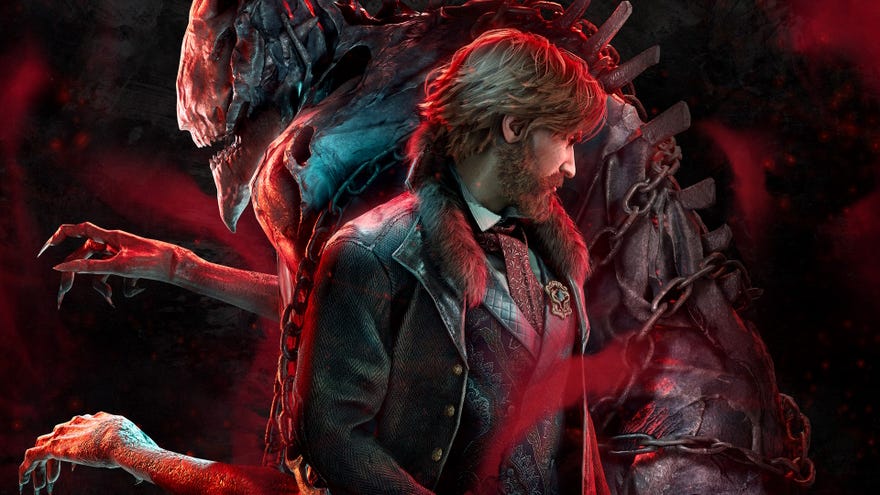The Thaumaturge is a detective RPG that's part Divinity: Original Sin, part evil Pokémon
The next game from the Witcher Remake and Seven: The Days Long Gone devs
When The Witcher Remake devs Fool's Theory and 11 bit studios announced their new RPG The Thaumaturge at the very end of February, I'll admit that the premise didn't immediately grab me. The announcement trailer was little more than an enigmatic pan through the streets of historic Warsaw, and its climactic reveal of a shadowy man performing some Naruto finger magic to conjure a Soulsian monster from the gloom made it seem like yet another supernatural yarn in the vein of Frogwares' The Sinking City and Cyanide's Call Of Cthulhu. The gameplay trailer (embedded below) that followed a few days later revealed a teeny glimmer of what its monster fights actually look like in the flesh, but I still wasn't quite convinced this supernatural tale of demon tamers and interdimensional rifts would end up doing enough to make it stand out.
But actually clapping eyes on it in person at GDC? The Thaumaturge had my full attention. Set in Warsaw in 1905 - a period where Poland didn't exist on any real-life map due to it being under occupation by Russia, Germany and Austria at the time - this dark fantasy RPG sees its titular paranormal 'miracle worker' delve deep into the city's political tensions, conducting isometric detective investigations that pull from Fool's Theory's support work on Larian's Divinity: Original Sin games, while also engaging in striking turn-based battles to root out the corruption plaguing its citizens. Plus, with its hard lean into Slavic, rather than Lovecraftian, folklore for its ungodly ghoulies, The Thaumaturge has shot right to the top of my 'keep an eye on this maybe surprise hit' list.
My hands off GDC demo begins right at the start of the game during the prologue. Thaumaturge Wiktor, the game's protagonist, isn't looking too hot as he sits on a train to a remote village in the middle of the Russian mountains. His skin is cracked and pale, and a web of sickly, dark veins splinter out from his sunken eyes and over his sharp cheekbones (and here I was thinking my jetlag was bad). He's reading a letter from his sister, who's understandably concerned about his health, but Wiktor's sickness isn't so much physical as it is spiritual.
Indeed, his sickness stems from his lost connection to his Salutor, which in this alternate history of the twentieth century is a kind of mythical being that heightens Wiktor's senses, lets him perceive hidden things about the world, and tame its very literal demons. These otherworldly beasts also appear as physical manifestations of people's flaws in The Thaumaturge - hidden to everyday folk, but to people like Wiktor, they pose a very real and dangerous threat to the world around them, so he needs to restore the bond with his own Salutor asap so he can continue to hunt them down and use their powers for good.
(Or at least I think he'll use them for good. When he's literally collecting a whole bevy of other people's 'bad vibes' throughout the game, who knows what will go down later on once he's got several of these beasts under his belt - but try as I might, publisher 11 bit studios wouldn't reveal any more details about The Thaumaturge's wider story during my demo session).
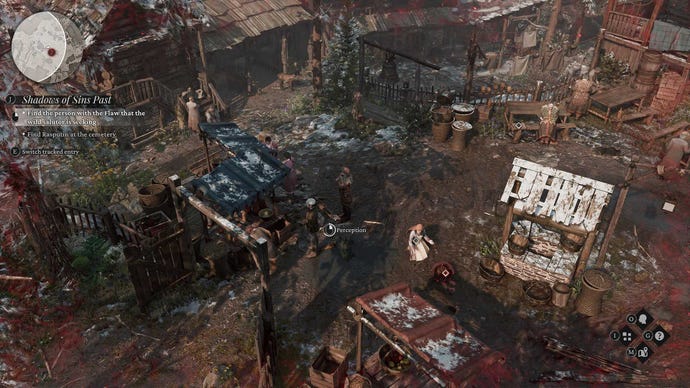
Of course, this idea of 'everyone has their own demons' (somewhat eye-rollingly crystalised in the game's tagline) is, on its own, one we've seen plenty of times before. The Salutors themselves have big Persona / demonic Pokémon energy for starters, but the Noise from The World Ends With You also played with the whole 'bad emotions come to life' schtick way back in 2007 (and more recently with its 2021 sequel). But based on what I saw in my demo session, The Thaumaturge seems to be shining a fresh light on this familiar trope, thanks to its absorbing turn-based battles and layers upon layers of intricately woven RPG systems - the latter of which I'm introduced to first as Wiktor begins his journey to restore his bond with his mysterious Salutor.
Given the time period, I wasn't wholly surprised to find that the man Wiktor's looking for is actually real-life Russian mystic Grigori Rasputin. Rasputin is one of a several historical figures to make an appearance in The Thaumaturge, although what role he'll play in the wider story is currently unknown. For now, though, Wiktor must find his current whereabouts in this cold, muddy village, and to do so he calls upon his Thaumaturgic skill of perception, revealing a highlighted trail of Rasputin's last movements. It's Batman's detective vision or Geralt's Witcher sense by another name, essentially, but its presentation and otherworldly connection to his powers as a Thaumaturge make it feel part and parcel of the world around him.
Telling you where to go isn't the only thing Wiktor's perception ability is good for, either. After tracking Rasputin down to a nearby tavern, the Russian mystic gives Wiktor a little test before he agrees to treat him. He tasks Wiktor with finding an object in the inn that belongs to him, giving him little more than a riddle to go on. Activating perception will quickly reveal which objects you need to home in on, but you'll also need to examine them to learn new information about them, and the untold secrets they hold. These secrets are sometimes readily available from the off, but deeper truths are locked behind certain skill checks, requiring players to invest skill points in the game's four central 'dimensions' to unlock them fully.
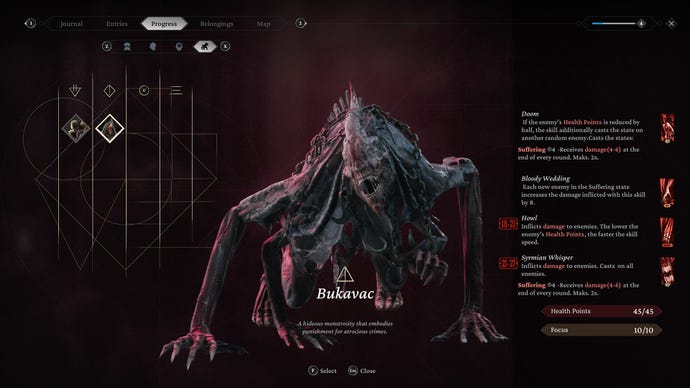
These dimensions embody 'Heart', 'Deed', 'Mind', and 'Word', and they form the foundation for rest of The Thaumaturge's entire RPG system. For example, levelling these up won't just reveal more about certain objects you pick up, but they'll also unlock additional dialogue choices, instantly putting me in the mind of the conversational skill checks in Baldur's Gate 3 and The Council. They also extend to the four broad categories of Salutor you'll encounter as well, determining what type of attacks they have in battle, and the tactics you'll need to use to tame and defeat them.
The first Salutor we meet after Wiktor passes Rasputin's little test is Upyr, a tall, hunched corpse-like figure with a cane shrouded by a billowing cape. In Slavic folklore, he's a kind of proto vampire demon, which is reflected here in his affiliation with the Heart dimension. In battle, this means Upyr's attacks are all focused around health, allowing him to heal Wiktor, but also deal more damage based on the health status of his enemies.
It's not long before we get to see Wiktor and Upyr in action either. With their bond restored, Wiktor now senses another wild Salutor lurking around the village, feeding on the flaws of its community. As a Thaumaturge, it's his job to find and tame it, ridding the village of its ills in the process. But to hunt down the origin of the flaw, Wiktor must first do a bit more investigating, speaking to the townsfolk , and using his perception skills to help narrow down his search, sensing secrets in the objects he touches and in the words he manages to get from the cagey villagers.
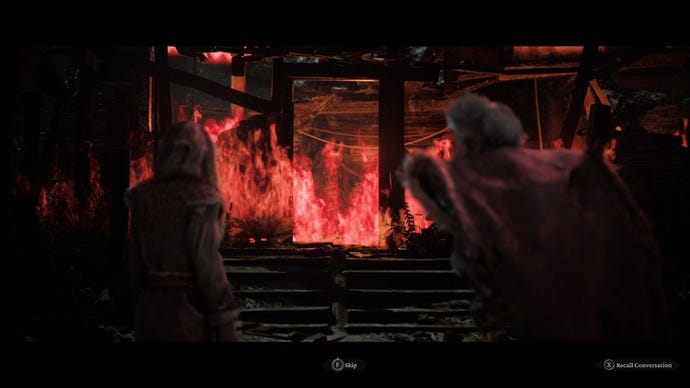
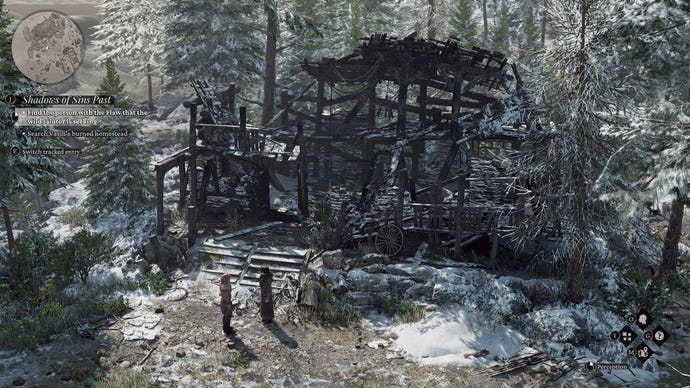
My demo skips forward here to bring the investigation to a head, and we find Wiktor and new pal Rasputin on the charred doorstep of a burned down house. The village elder was supposedly killed here not that long ago, and fingers are being pointed at the elder's son-in-law, who's working in the fields nearby. Before Wiktor and Rasputin can gather any more clues, however, some Russian soldiers turn up and threaten the pair to leave things well alone. Wiktor's not having any of that, of course, and a fight ensues.
As mentioned earlier, battles are turn-based in The Thaumaturge, and an action queue fills the top of the screen, showing who will attack when and in what order - a regular turn-based staple these days, but one that's tied quite neatly into Wiktor's heightened sense of perception here, giving it a reason to exist rather than just being another bit of interface. The same goes for the power of each attack, which has a clearly marked up damage range next to it, and the amount of time it will take to execute, which can in turn have knock-on effects on the action queue.
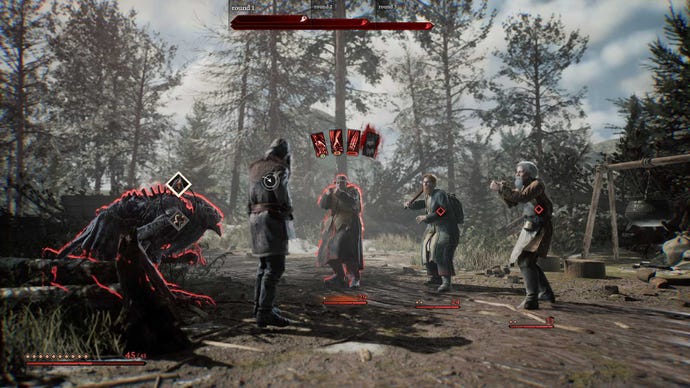
Reducing an enemy's health to zero is obviously the key objective here, but in addition to their health bars you've also got focus points. Get rid of these and an enemy will be dazed and distracted for a turn, allowing you to use special strong attacks for extra damage. I love it when turn-based RPGs have a stagger system in the mix, so I'm pleased to see The Thaumaturge making good use of one here to help liven up its beefy fisticuffs. Alas, Rasputin did not partake in the fight as well, but Wiktor and Upyr were a more than capable duo against the trio of soldiers.
With the soldiers swiftly taken care of, it's now time for that confrontation with the elder's son-in-law. As your conversation starts to get a bit heated, the wild Salutor finally makes an appearance, setting the stage for an even bigger battle with Wiktor and Upyr. Finally, Wiktor must put his restored Thaumaturgy powers to the test and tame the beast known as Bukavac, rendered as an enormous, six-limbed shadow that fills the entire screen in a dramatic sweep of smoke and glowing eyes and teeth.
It's visually arresting, especially compared to the more mundane punch-up we've just had with the soldiers, and part of me wonders how tiny little Wiktor will even be able to land a hit on it. Turns out, he won't have to, as wild Salutors cannot be fought directly. Instead, you fight their proxies, the people they have possessed and control in the real-world, and who now stand equally glowy-eyed in front of Bukavac, ready to act as its punching bags. Only by taking them down can you start to drain the Salutor's screen-wide health bar, and eventually get it low enough for you to initiate the taming ritual. Salutors can still attack us in the meantime, of course, and Bukavac's primary attack is Doom, which adds a bleed-like Suffering debuff to us at the end of each turn.
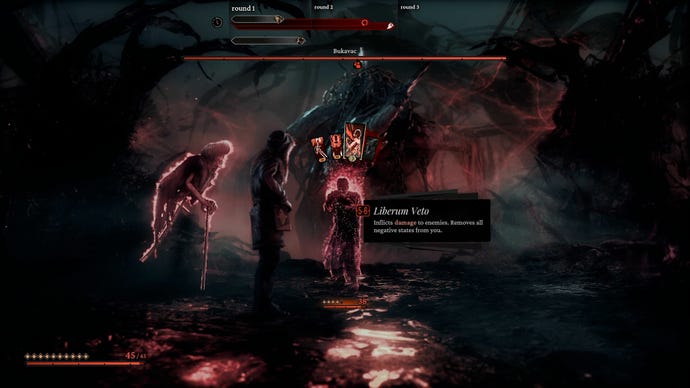
These battles look every bit as grand and tactical as Final Fantasy boss battles to my eye, although for the sake of time, my demo skips forward again to have Wiktor successfully tame Bukavac and bring him under control. In future fights, Wiktor will be able to switch between Upyr and Bukavac to make use of their unique abilities as he sees fit, and I'm intrigued to see what other fanged monstrosities Wiktor will uncover when he heads back to Warsaw, which the game's main setting. Rasputin will also be following Wiktor back to Warsaw, I'm told, but my demo unfortunately comes to close before I can find out more.
Still, I'm excited to see what's in store for the gang when they return to Wiktor's hometown, especially when publishers 11 bit studios tease that other wild Salutors they'll encounter will draw from all kinds of different Slavic folklore creatures based on the cultures and nationalities residing in Warsaw at the time. As mentioned right at the start of this preview, 1905 was a time of great upheaval in Warsaw, and 11 bit tell me this was a very deliberate choice on the part of the developers. They wanted to show this specific time period and its political tensions as part of the story, and I'm intrigued to see how they'll fold it in to The Thaumaturge's supernatural demon taming. It's not clear whether Warsaw will be completely open to explore once you get there just yet, or how often your investigations will get interrupted by its dazzling turn-based battles, but I'm keen to find out all the same. If Fool's Theory can strike the right balance between its supernatural detective work and psychic scuffling, The Thaumaturge could be one of the most thrilling RPGs you'll play this year.
